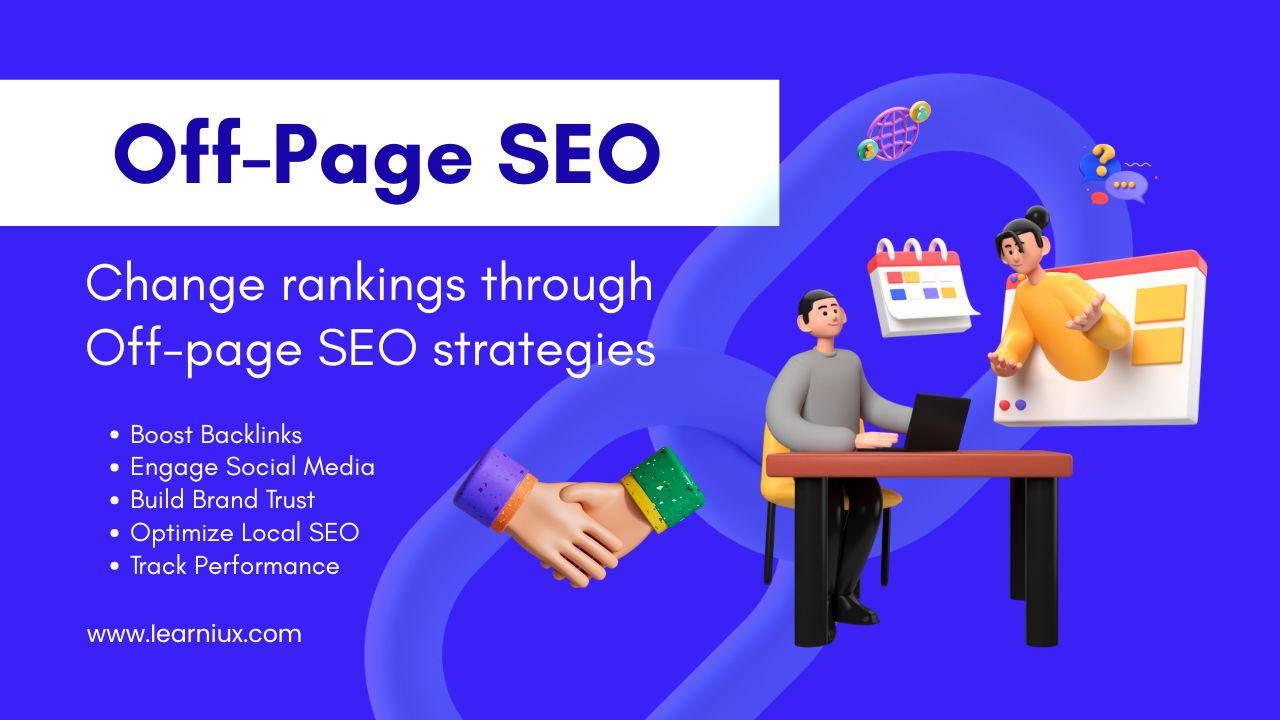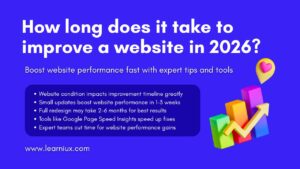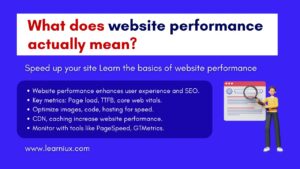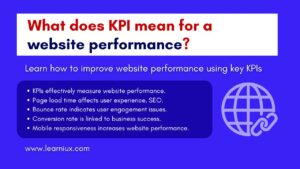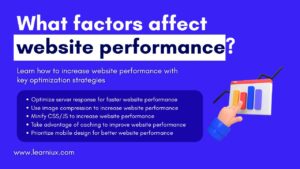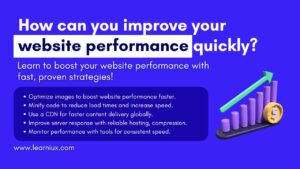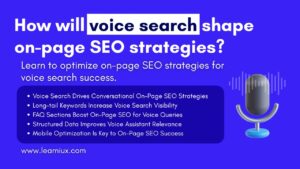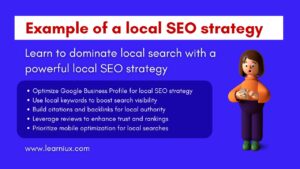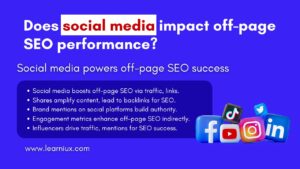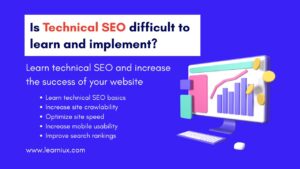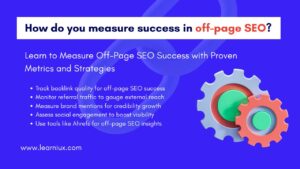Off-Page SEO is a crucial component in strengthening your online presence. It improves a website’s search engine ranking, increases credibility, and drives organic traffic. This article sheds light on the in-depth aspects of Off-Page SEO, discussing the latest strategies, their benefits, and effective implementation. Whether you are a beginner or an experienced digital marketer, this article will provide you with comprehensive information on Off-Page SEO.
What is Off-Page SEO
Off-Page SEO refers to all the activities outside of a website that are done to improve search engine rankings and build online reputation. These include link building, social media marketing, brand mentions, influencer collaborations, and local SEO. Unlike on-page SEO, which involves elements on the website such as content, meta tags, and site structure, Off-Page SEO focuses on external credibility and authority.
Search engines, (especially Google) use external signals to determine the credibility of a website. For example, when high-quality websites link to your site, search engines consider your site to be more trustworthy and relevant. Strategies in Off-Page SEO reinforce these external signals and help your website appear on the first page of search results.
Importance of Off-Page SEO
The importance of Off-Page SEO lies in the way search engines work. Google’s algorithms use the E-E-A-T (Experience, Expertise, Authoritativeness, Trustworthiness) criteria to assess the credibility of a website. Off-Page SEO helps in meeting these criteria. Here are some of the key benefits:
- Ranking Improvement: Search engines prioritize your website due to high-quality backlinks.
- Brand Awareness: Your brand reaches more people through social media and brand mentions.
- Organic Traffic: Links and social signals from trusted sites drive more traffic to your website.
- Reputation Management: Positive reviews and brand mentions increase the credibility of your business.

Key Strategies of Off-Page SEO
Follow the strategies below to successfully implement Off-Page SEO. Each strategy is explained in detail so that you can implement it effectively.
1. Get High-Quality Backlinks
Backlinks are the backbone of Off-Page SEO. When other websites link to your site, search engines see your content as a “vote of confidence.” But not all backlinks are created equal. Links from low-quality or spammy sites can hurt your rankings. The following methods are effective for getting backlinks:
Guest Posting
Writing guest posts on industry-related blogs is a great way to get backlinks. Create high-quality content and link to relevant pages on your website in that article. For example, if your business is related to digital marketing, write guest posts on technology or marketing blogs. This gives you the opportunity to reach new audiences with backlinks.
- Strategy: Check the quality of the blogs’ content and the type of audience they have before reaching out.
- Tip: Include links naturally in your guest posts and avoid over-optimization.
Outreach
Outreach is the process of contacting bloggers, webmasters, or influencers and asking them to link to your content. To do this, you must create high-quality content that is worthy of linking.
Broken Link Building
Broken link building is an effective strategy in which you find broken links (404 error pages) on other websites and propose to replace them with your content.
- Strategy: Find broken links using tools like Check My Links or Screaming Frog.
- Tip: The topic and quality of your content should match the content of the broken link.
Directory Submission
Submitting your website to high-quality directories is another way to get backlinks. These include industry-specific directories or local business directories.
- Strategy: Choose reliable and relevant directories and keep your information consistent.
- Tip: Avoid spammy directories, as these can lead to penalties from search engines.
2. Increase your social media presence
Social media platforms are a powerful tool for off-page SEO. While social media links don’t directly impact search rankings, they do drive brand visibility, traffic, and content sharing.
Content Sharing
Share your blog posts, infographics, videos, and other content on social media platforms. This will get your content a wider audience and encourage them to visit your website.
- Strategy: Create content that is optimized for each platform. For example, visual content for Instagram and professional articles for LinkedIn.
- Tip: Use a call-to-action (CTA) for sharing, such as “Visit our latest blog!”
Influencer Collaboration
Collaborating with industry influencers can help your brand reach a larger audience. Influencers can share your content or link to your website.
Social Bookmarking
3. Online Reputation Management
Your brand’s online reputation plays a key role in Off-Page SEO. A positive reputation encourages search engines and audiences to trust your brand.
Reviews and Ratings
Encourage customers to leave positive reviews on Google My Business, Yelp, Trustpilot, or other platforms. Positive reviews increase your brand’s credibility and contribute to local SEO.
- Strategy: Use email or social media campaigns to encourage customers to leave reviews.
- Tip: Respond to every review, especially negative ones, in a professional manner.
Brand Mentions
Track non-linked mentions that mention your brand and try to convert them into links. For example, if a blog mentions your brand but doesn’t provide a link, reach out to the blogger and request that they include the link.
- Strategy: Monitor brand mentions using tools like Google Alerts or Mention.
- Tip: Provide value when converting mentions to links, such as additional resources or information.
Managing Negative Comments
Handle negative reviews or comments promptly and professionally. This maintains your brand’s credibility and sends positive signals to search engines.
- Strategy: Maintain a calm and solution-oriented approach when responding to negative reviews.
- Tip: Encourage customers to leave positive reviews after resolving their complaints.
4. Optimize for Local SEO
For local businesses, local off-page SEO strategies are especially effective. This makes it easier to reach a local audience and increases visibility in local search results.
Local Directories
List your business in Google My Business, Bing Places, Yelp, and other local directories. This increases your business’s online visibility and improves local search rankings.
- Strategy: Keep your business name, address, and phone number (NAP) consistent across all directories.
- Tip: Add high-resolution photos and detailed business information.
Local Citations
Citations are mentions of your business’ NAP in online directories or websites. Consistent citations are important for local SEO.
- Strategy: Manage citations using tools like Moz Local or BrightLocal.
- Tip: Focus on the quality of local citations, not the quantity.
Community Events
Increase your brand visibility through local events, sponsorships, or charity campaigns. This builds relationships with local audiences and earns brand mentions.
- Strategy: Let local news outlets or blogs know about your events.
- Tip: Keep track of links or mentions from events.
New Trends in Off-Page SEO
Search engine algorithms are constantly evolving, so it’s important to keep up with new trends. Here are some of the latest trends:
Emphasis on E-E-A-T
Google now places more emphasis on E-E-A-T (Experience, Expertise, Authoritativeness, Trustworthiness). Your E-E-A-T score improves when your website receives backlinks and positive mentions from trusted sources.
- Strategy: Collaborate with industry experts and get them to endorse your content.
- Tip: Display your author’s bio and credentials on your website.
Videos and Visual Content
Platforms like YouTube, TikTok, and Instagram Reels boost Off-Page SEO through video content. Engaging videos expose your brand to a wider audience.
- Strategy: Create educational or entertaining videos related to the content on your website.
- Tip: Include a link to your website in the video description.
AI-Based Optimization
AI tools are useful for backlink analysis, understanding competitor strategies, and content recommendations. For example, tools like Ahrefs or SEMrush perform in-depth analysis of your backlink profile.
- Strategy: Study your competitors’ backlink sources using AI-based tools.
- Tip: Regularly audit your backlink profile and remove toxic links.
Voice Search and Mobile SEO
Voice search usage is on the rise, and local search and mobile optimization are a priority in Off-Page SEO.
- Strategy: Optimize keywords for local search, such as “restaurants near me.”
- Tip: Optimize your Google My Business profile for mobile users.
Mistakes to Avoid in Off-Page SEO
To be successful in Off-Page SEO, it is essential to avoid some common mistakes:
- Low-quality backlinks: Getting backlinks from spammy or unrelated sites can hurt your rankings.
- Over-optimization: Keyword stuffing or unnatural link building can lead to penalties from search engines.
- Social media neglect: Ignoring social signals can lead to reduced brand visibility.
- Unethical practices: Avoid link buying or using black-hat SEO techniques, as this can get your website blacklisted.
Measuring Off-Page SEO Results
Use the following metrics to measure the success of your Off-Page SEO efforts:
- Backlink Profile: Check the quality and quantity of backlinks using Ahrefs, Moz, or SEMrush.
- Organic Traffic: Analyze the traffic coming to your website using Google Analytics.
- Domain Authority: Check your website’s authority score using Moz or Ahrefs.
- Social Engagement: Monitor likes, shares, and comments on social media posts.
- Keyword Rankings: Keep an eye on the rankings of your target keywords and analyze their progress.
How to Analyze Results
Take a data-driven approach to analyzing results. For example, if you ran a guest posting campaign, evaluate the traffic and backlinks you received after that campaign. Track clicks and impressions on your website using Google Search Console. Additionally, study your competitors’ strategies and refine your approach.
Future Prospects for Off-Page SEO
The future of Off-Page SEO depends on the evolving algorithms of search engines. In the future, there will be more emphasis on the following:
- User Experience: Search engines are paying more attention to user engagement, such as time spent on a website and bounce rate.
- Semantic Search: Context and user intent will become more important than keywords.
- Voice and Mobile Search: There will be more focus on local and mobile search optimization.
- AI and Machine Learning: Search engines are getting smarter, so focus on natural and high-quality content.
Conclusion
Off-Page SEO is a key tool for digital success, helping your website rank higher in search engines and increasing brand credibility. With the right combination of high-quality backlinks, an effective social media presence, a positive online reputation, and a local SEO strategy, you can significantly increase your website’s organic traffic and visibility. The success of Off-Page SEO is not just about quantity, but also about quality and ethical practices. It’s important to avoid spammy links or unnatural tactics, as these can lead to penalties from search engines.
With search engine algorithms constantly changing, it’s essential to keep up with the latest trends such as E-E-A-T, video content, and AI-based optimization. You can achieve long-term success by understanding your audience’s needs and creating content that provides them with value. Regularly analyze your backlink profile, measure social engagement, and focus on local search optimization. Off-Page SEO is an ongoing journey that requires consistency and patience. With the right strategy and consistent efforts, you can take your brand to new heights of online success and win the trust of your audience, including search engines.
FAQs
What is Off-Page SEO and what is its importance?
Off-Page SEO refers to activities outside the website that are done to improve search engine rankings and build online reputation. These include backlinks, social media marketing, and brand mentions. Off-Page SEO makes a website appear trustworthy and relevant in the eyes of search engines. High-quality backlinks increase domain authority, which directly impacts rankings. A social media presence increases brand awareness and helps you interact with your audience. Positive reviews and brand mentions increase credibility. Local SEO strategies help you reach local audiences. Proper use of Off-Page SEO increases organic traffic and leads to long-term success. This helps your brand stay ahead of the online competition.
What is the difference between Off-Page SEO and On-Page SEO?
Off-Page SEO involves activities outside the website, such as backlinks, social media, and brand mentions, while On-Page SEO focuses on elements on the website. On-Page SEO includes content optimization, meta tags, keyword usage, and site structure. Off-Page SEO focuses on increasing external credibility and authority. For example, acquiring backlinks from high-quality websites is part of Off-Page SEO, while optimizing blog posts on a website is On-Page SEO. Both strategies complement each other and together improve rankings. Off-Page SEO shows search engines the credibility of your website. On-Page SEO improves user experience and makes content relevant. Striking a balance between the two is essential for successful SEO. Off-Page SEO strengthens a brand’s online reputation.
Why are backlinks important for Off-Page SEO?
Backlinks are the backbone of Off-Page SEO because they show search engines the credibility and relevance of your website. When high-quality websites link to your site, search engines consider your content a “vote of confidence.” This increases domain authority and improves rankings. However, low-quality or spammy backlinks can hurt rankings. It’s important to get natural backlinks through strategies like guest posting, outreach, and broken link building. Backlinks drive organic traffic and improve brand awareness. Search engines check the quality and relevance of the backlink source. So, focus on getting links from sites that are relevant to your industry. Use tools like Ahrefs or Moz to analyze backlinks.
How does social media help with off-page SEO?
Social media plays a key role in off-page SEO by increasing brand awareness and audience engagement. Although social media links don’t directly impact rankings, they do increase the visibility of your content. Sharing engaging posts, videos, and infographics drives traffic to your website. Influencer collaborations help your brand reach a larger audience. Submitting content to social bookmarking sites like Reddit or Pinterest increases visibility. Consistent posting and interacting with your audience builds a positive brand image. This indirectly sends positive signals to search engines. Create content that is optimized for each platform. For example, visuals for Instagram and professional content for LinkedIn are effective. Social media campaigns boost brand reputation along with rankings.
What is the role of Off-Page SEO in local SEO?
Off-Page SEO in local SEO helps you reach a local audience and improve your local search rankings. It is important to list your business in local directories like Google My Business, Yelp, and Bing Places. A consistent name, address, and phone number (NAP) builds credibility through local citations. Brand visibility improves through local events or sponsorships. Positive customer reviews influence local search results. Backlinks from local blogs or newspapers boost local SEO. Tools like Moz Local or BrightLocal help manage citations. Keyword optimization for local search, such as “shop near me,” is effective. Off-Page SEO puts local businesses ahead of the competition and builds relationships with their audience.
What is the importance of E-E-A-T in Off-Page SEO?
E-E-A-T (Experience, Expertise, Authoritativeness, Trustworthiness) is Google’s criteria that determine a website’s credibility. High-quality backlinks and positive brand mentions are important for improving E-E-A-T in Off-Page SEO. Getting endorsements from industry experts makes your content credible. Positive reviews and brand mentions build trust. For example, links from trusted websites increase your website’s authority. Displaying author bios and credentials shows expertise. Spammy links or negative reviews can harm E-E-A-T. Regular backlink audits and reputation management improve E-E-A-T. This makes search engines prioritize your website and increases rankings.
What tools should be used for Off-Page SEO?
Tools for Off-Page SEO are useful for backlink analysis, competitor strategies, and brand mention monitoring. Ahrefs and Moz are effective for checking backlink profiles and assessing quality. SEMrush helps in studying competitor strategies. BuzzSumo is useful for content sharing and finding influencers. Google Alerts tracks brand mentions. Hunter.io helps in finding email addresses for outreach. Moz Local and BrightLocal manage citations for local SEO. Google Analytics measures organic traffic and user engagement. These tools help in making data-driven decisions and optimizing strategies.
What are the mistakes to avoid in Off-Page SEO?
Avoiding mistakes in Off-Page SEO is essential for success. Acquiring low-quality or spammy backlinks can lead to penalties from search engines. Over-optimization, such as keyword stuffing or unnatural link building, harms rankings. Ignoring social media reduces brand visibility. Using link buying or black-hat SEO techniques can get a website blacklisted. Avoid acquiring backlinks from unrelated sites, as this reduces relevancy. Ignoring negative reviews damages reputation. Conduct regular backlink audits and adopt ethical practices. Avoiding mistakes leads to long-term success.
How to measure the results of Off-Page SEO?
Use data-driven metrics to measure the results of Off-Page SEO. Check the quality and quantity of backlink profiles using Ahrefs or Moz. Measure organic traffic and user engagement with Google Analytics. Check Domain Authority Score on Moz or Ahrefs. Monitor likes, shares, and comments on social media posts. Google Search Console tracks clicks and impressions. Analyze ranking progress for targeted keywords. Check reviews and search visibility on Google My Business for local SEO. Regular analysis helps improve strategies and measure success.
What is the role of video content in Off-Page SEO?
Video content increases brand visibility and audience engagement in Off-Page SEO. Platforms like YouTube, TikTok, and Instagram Reels help reach a large audience. Creating educational or entertaining videos grabs the attention of users. Including website links in the video description increases traffic. Sharing videos through influencers improves brand awareness. Search engines prefer video content, as it improves the user experience. Use keyword optimization and attractive thumbnails for videos. Videos become more visible through social media sharing. This indirectly has a positive impact on search rankings.

